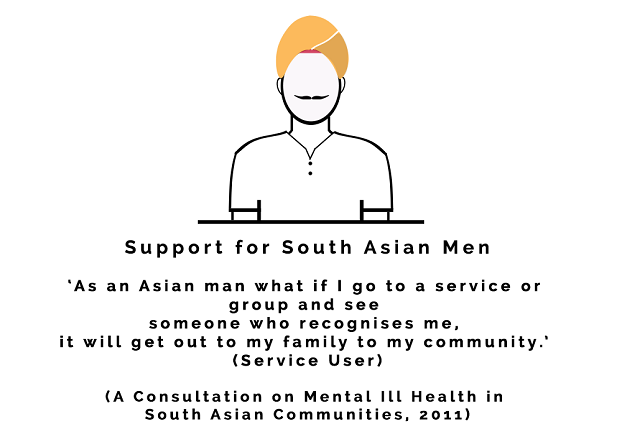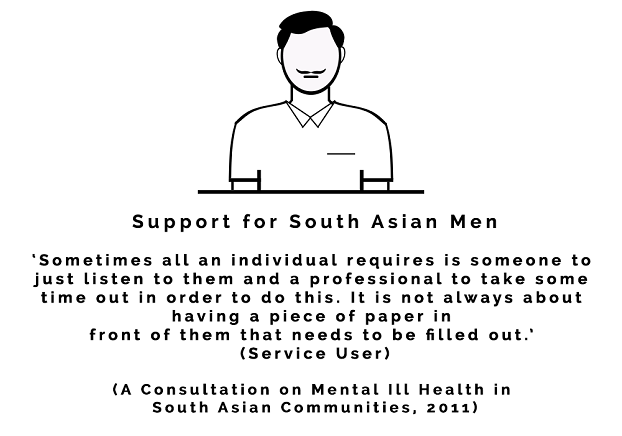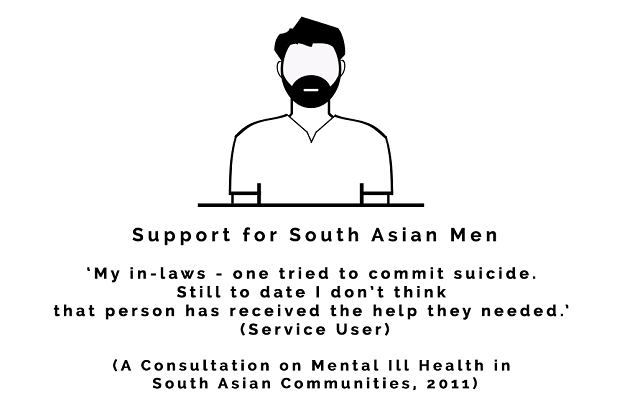To my brown brothers,
It’s been a year and two months since most of my time was occupied by my severe anxiety. Before anxiety hit, I believed I’d achieved the pinnacle of my life: A first class honors degree, a job and all the associated material rewards. Quite the accomplishment for an overachiever like myself. But of course when anxiety arrived no amount of material success could save from me from a tidal wave of distress.
My anxiety hit me hard on what started as a relaxing Saturday. The day soon turned into an evening of utter confusion. I remember sitting on the couch being swept suddenly by the strongest form of continuous tingling sensation on the back of my head. This was something I could not get rid of no matter what I tried. In the coming months, I would end up in a state of confusion, feeling a sense of impending danger and an inability to concentrate.
While the initial triggers ranged from endless overthinking on maintaining the “dream job” I had recently obtained to sustaining an lifestyle I had cultivated, such triggers lost all meaning and all that triggered me now was the idea, “What is wrong with me?” It was a phrase that brought on more sensations and imagined scenarios — in all of which I suffered from hopelessness and uncertainty.

These symptoms were only compounded by my lack of knowledge. Although I was sympathetic to those who lived with mental health problems in my family and my community, I never truly paid much attention to what it must have been like for them. We just didn’t accept the idea of mental health problems, let alone speak about them.
In our community there is the general feeling that things will get better…or if you pray enough, things will get better. Sympathy and support is superficial and passive. Our community doesn’t take an active approach to provide care to those dealing with mental health issues. Negative emotions tend to get swept under the rug.
In hindsight, the signs were always there that severe anxiety would enter my life one day. Even as a young child, I incessantly worried about the future. The summer I was 15 years old, my obsession and insecurities led me to become anorexic — I lost over 40 pounds in 4 months. Later on, I would learn just what a volatile period your 20s could be — during which mental illness can become pronounced. This is a period in which many young adults experience severe pressure from our first job, moving out on our own, or experience our first bad break-ups.

I simply thought I would never have severe anxiety in my life because although I was exposed to it from a very young age, I was raised to believe that the individuals with mental health problems were simply the “bad apples” or weak people that we shunned in their moment of need. No one in my family or my community introduced me to the concept that mental health problems could affect any of us one day. It was never something that openly discussed so I was at a loss when trying to make sense of what was happening.
I learned the hard way that mental illness does not discriminate, and its impact on the South Asian communities is as prevalent as it is in any other community. Currently in the UK it’s estimated that about a quarter of the population will experience a form of mental health problem in the course of a given year with anxiety and depression being the most common.
A 2010 study based in Harrow, North West London, researched mental health problems in South Asian communities and found that the causes of mental health illnesses are quite often misunderstood.
Nevertheless it is essentially the diagnosis — or lack of one — that ultimately influences the level of treatment offered let alone sought by us and for us.
The misunderstanding around an initial diagnosis may be adversely affected by the cultural backgrounds into which we are socialized. For instance, a 2008 study of mental health in South Asian communities (A Consultation on Mental Ill Health in South Asian Communities) found that terminology serves as a key issue with regard to the stigma surrounding mental health illnesses. Languages such as Urdu, Punjabi and Gujarati do not have adequate terms to communicate about mental illness. As a result, derogatory terms are used.
The most apparent misunderstood causes for mental health issues within the Asian communities according to the Harrow study range from ideas about “God’s will,” genetics and even bad parenting. From the point of view of a mental health patient, these unquestioned cultural biases about mental health illnesses merely make matters worse. To be told our situation is a result of “God’s will” or bad genetics or not to think about it only adds to our loneliness and despair. We wonder if we are simply homeless — “damaged” souls.

The pressures of South Asian cultural norms don’t help with fears (sharam) of damage to the family reputation and even marriageability once the tag ‘madness’ is labelled. However I shouldn’t moan because patriarchy makes such a situation significantly more difficult for women of our communities.
Our community seems to believe that because we’re brown and male, mental illness just doesn’t happen to us. We’re identified as the heads of our families or leaders and entrepreneurs in our communities. Even our local doctors fail to provide referrals and support for South Asian men. The expectation that we not be vulnerable leaves us feeling alone, suffering in silence, trapped by the masculinity imposed upon us within our communities and families.
“Our community seems to believe that because we’re brown and male, mental illness just doesn’t happen to us.”
I have learned that recovery from mental illness was possible with time and self-care. I had essentially created illusions of what it meant to be “successful” in a post-graduate environment — and what I needed to realize was that in order to live my life without self-imposed pressures, burdens, and sorrow, I would have to quit my “dream job.” I resolved to derive meaning from the unwilling step back anxiety bestowed upon me from a tremendously anxiety-ridden and hectic lifestyle I had adopted. Everyday happiness was something I had to reimagine and work towards. It was a process that took me months to figure out.
So don’t shun your suffering brothers, sons, nephews and cousins. Don’t deem them weak or damaged, for they need your support. It isn’t “God’s will.” It’s a situation which can be made better if you choose to listen and support. We have to break down generations of cultural conditioning related to our perceptions towards men in our communities. We also need greater dialogue between mental health services and South Asian communities. This might be accomplished by distributing the relevant information in community settings such as religious and community centers.
You just might be surprised how far speaking and listening can go for those who are hoping to quell the countless fears in our minds.
Yours,
Recovering Me
* * *
Images by Taimour Fazlani, an activist writer and designer who is a part of the Media Diversified and Zod Culture collective, amongst others. You can find him on Twitter @talkativebeard.












